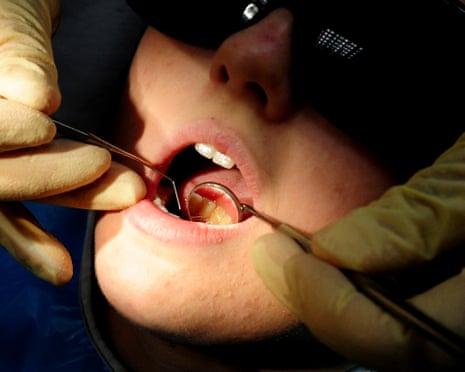Health
Government Tackles Dental Divide with New Initiatives for Children

The UK government is taking significant steps to address oral health among disadvantaged primary school pupils. The introduction of breakfast clubs, which are part of a broader initiative, will not only provide meals but also train children in proper toothbrushing techniques. This decision comes in response to alarming data that indicates 20% of five-year-olds in England have experienced tooth decay.
The issue of dental health is compounded by geographical disparities. According to a recent analysis from the Local Government Association, there is a pronounced dental divide across different council areas. For instance, children in deprived regions are significantly more affected by tooth decay compared to their peers in wealthier areas. In Middlesbrough, there are only 10 NHS dental practices per 100,000 people, while in affluent Richmond upon Thames, that number rises to 28.
This disparity in dental care availability highlights a broader trend of health inequalities that have persisted over the years. The founding principles of the National Health Service (NHS) aimed to ensure equitable health service distribution. Yet, as poverty levels have escalated and healthcare costs have risen, the gap in health experiences and outcomes based on socioeconomic status has widened, including a notable divergence in life expectancies.
While the provision of some NHS services appears relatively uniform across England, evidence suggests that access to dental care remains problematic. Emergency admissions, particularly in the most deprived communities, are nearly double those in wealthier areas. These inequalities are concerning, especially given the established links between poverty and other diet-related health issues, such as obesity.
In response to these challenges, Health Secretary Wes Streeting has committed to reforming the dental contract during this parliamentary session. Proposed changes include a “tie-in” that would require dentists trained in the UK to serve in the NHS for three years after qualification. However, without increased funding for NHS dentistry, improvements in service delivery in deprived areas may not be achievable. Currently, many dental practices rely on fees from private patients, which incentivizes dentists to work in areas with higher-paying clients.
In June 2023, the government announced a shift of £2.2 billion in NHS spending toward poorer regions, which is expected to positively impact both dental and overall health services. However, experts argue that prioritizing funding for dentistry is essential to effectively narrow existing gaps in access and health outcomes.
Evidence regarding the government’s “golden hello” scheme, which offers one-time payments to attract dentists to underserved areas, suggests only modest success. Meanwhile, a similar initiative aimed at addressing GP shortages may be at risk of cuts.
The predominance of private dental care over public services serves as a stark reminder of the implications of market forces in healthcare. In areas labeled as “dental deserts,” the absence of accountable policymaking raises critical questions about equitable health access for all citizens.
As the government moves forward with these initiatives, the focus must remain on ensuring that all children, regardless of their background, receive the dental care they need to thrive.
-

 World2 weeks ago
World2 weeks agoCoronation Street’s Shocking Murder Twist Reveals Family Secrets
-

 Entertainment1 week ago
Entertainment1 week agoAndrew Pierce Confirms Departure from ITV’s Good Morning Britain
-

 Entertainment5 months ago
Entertainment5 months agoKate Garraway Sells £2 Million Home Amid Financial Struggles
-

 Entertainment4 months ago
Entertainment4 months agoAnn Ming Reflects on ITV’s ‘I Fought the Law’ Drama
-

 Entertainment1 month ago
Entertainment1 month agoCoronation Street Fans React as Todd Faces Heartbreaking Choice
-

 Health4 months ago
Health4 months agoKatie Price Faces New Health Concerns After Cancer Symptoms Resurface
-

 World1 month ago
World1 month agoBailey Announces Heartbreaking Split from Rebecca After Reunion
-

 Entertainment2 weeks ago
Entertainment2 weeks agoTwo Stars Evicted from I’m A Celebrity Just Days Before Finale
-

 Entertainment4 months ago
Entertainment4 months agoCoronation Street’s Carl Webster Faces Trouble with New Affairs
-

 World2 weeks ago
World2 weeks agoKevin Sinfield Exceeds Fundraising Goal Ahead of Final Marathons
-

 Entertainment4 months ago
Entertainment4 months agoWhere is Tinder Swindler Simon Leviev? Latest Updates Revealed
-

 Entertainment5 months ago
Entertainment5 months agoMarkiplier Addresses AI Controversy During Livestream Response





















